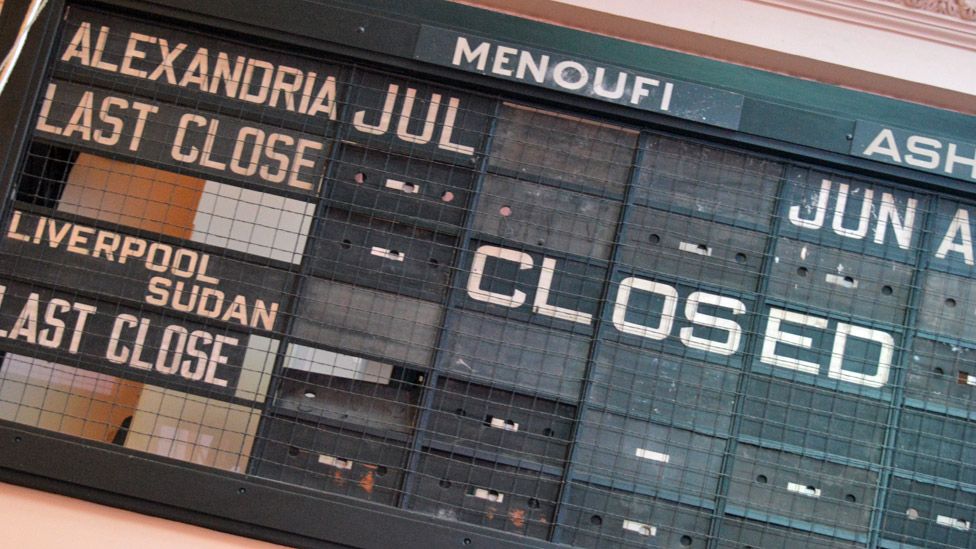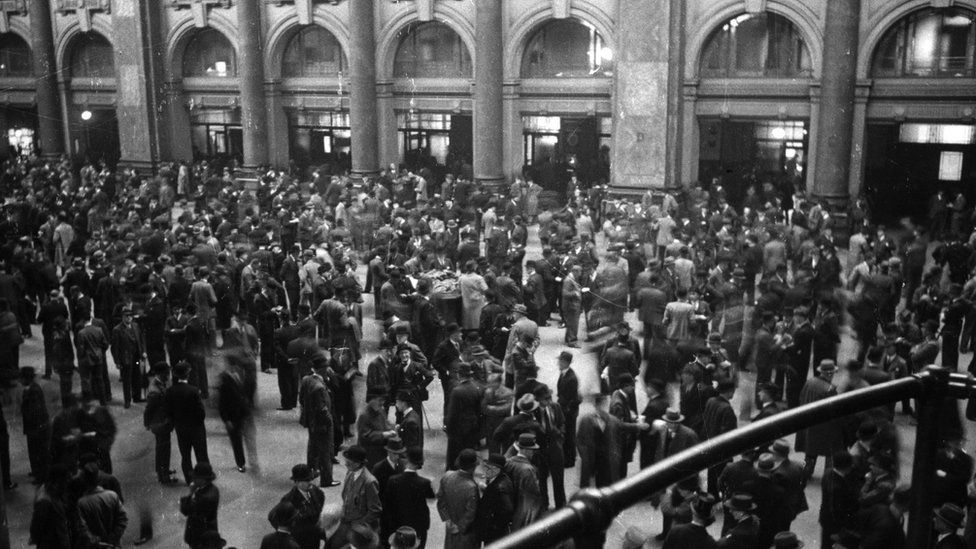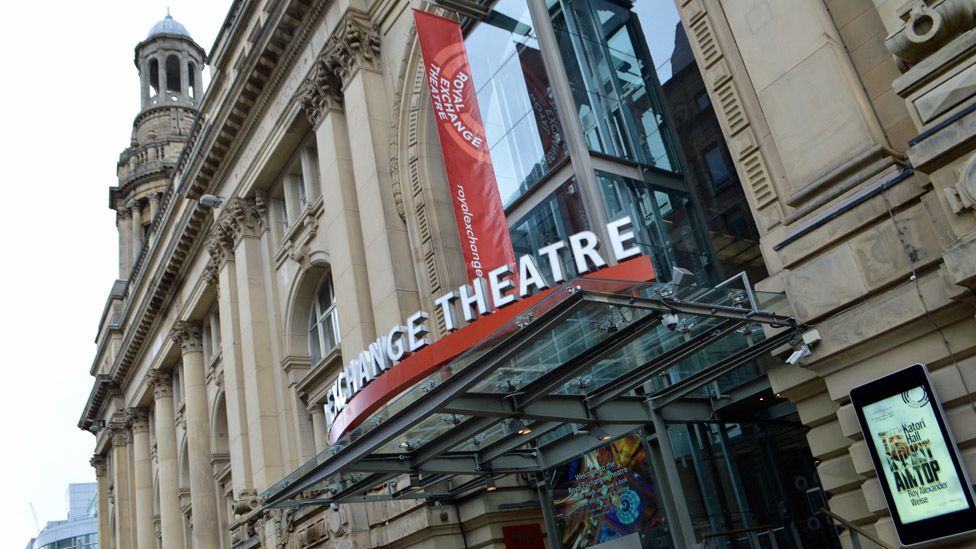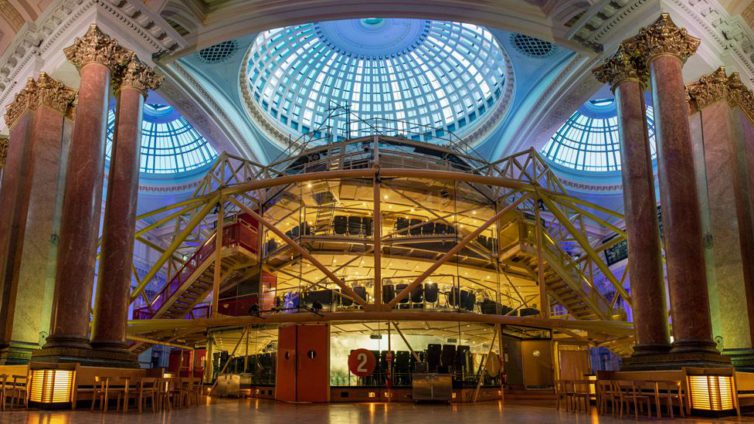A Manchester theatre is facing up to its history at the heart of the 19th Century cotton industry, which depended on slavery in America.
An almighty clash of styles greets visitors who step inside the Royal Exchange.
You see the giant pink Victorian marble pillars and the domed glass roof of the opulent grand hall.
But you can't fail to notice the industrial 1970s metal frame and brightly coloured staircases of the theatre module, which looks like a spaceship that's landed in the middle of the floor.
Amid that visual onslaught, it's easy to overlook some slightly dilapidated wooden boards high on one wall.
They bear names - Liverpool, New York, Alexandria, Paris, Sudan - and some numbers.

It still may not be immediately clear that they are the only obvious remnants from the building's original purpose.
They show the final prices from when the Royal Exchange was the main trading floor in the cotton capital of the world.
Five thousand merchants gathered in the building in the mid-19th Century to strike deals to export the cloth that had been manufactured in the city's mills. Manchester was known as Cottonopolis, and the Royal Exchange was the "parliament of the cotton lords".
Trading stopped in 1968 - the date 31 Dec on the boards was its final day.
The hall was transformed into a theatre when the seven-sided spaceship was installed eight years later. Names like Kate Winslet, Hugh Grant, Helen Mirren and Maxine Peake have appeared there since.
The building's history and the rest of Manchester's industrial past have generally been sources of pride and celebration.
But when Roy Alexander Weise was appointed joint artistic director with Bryony Shanahan in 2019, becoming the first black person to hold that position, he suddenly had second thoughts.

"Some people reflected back to me that as a black person, they just would never walk into here," he says, sitting beneath the trading boards in the echoing hall.
"It's been a place that has, like, sold their ancestors, and people feel a really visceral… they really repel from the idea of coming here because of what it has stood for in the past."
The traders in fact sold consignments of cotton goods, but until slavery was abolished in America in 1865 those goods were usually made with cotton picked by the hands of enslaved people in the southern states.
Although many people in Manchester opposed it, the system of slavery - the mass enforced labour, subjugation and torture of people taken from Africa and the descendants of those people - was partly fuelled by the global cotton trade.
The Royal Exchange (along with another market in Liverpool for raw cotton) was the epicentre of that trade.
And the prices had a direct effect on the other side of the Atlantic. A freed slave named John Brown wrote: "When the price rises in the English market, even but half a farthing a pound, the poor slaves immediately feel the effects, for they are harder driven, and the whip is kept more constantly going."

Weise says: "I think I've always known the history of this building, but not in a great amount of detail."
He accepted the job running the theatre that now occupies the trading hall despite his fears of becoming "a sell-out", deciding it was better to try to change its purpose and status from the inside.
Because of the pandemic, his first show there as director - Katori Hall's Olivier Award-winning The Mountaintop, about Martin Luther King's last night before his assassination - only opened last month.
Now he and Shanahan are confronting the building's past head-on, and trying to make it welcoming for people who may not previously have stepped inside, with a long-term series of works under the title Disrvpt.
"Disrvpt was born out of a really strong desire to continue this occupation but to be more revolutionary in what it is - not just put on nice plays with beautiful costumes, but to really crack open the idea of who belongs in this space," he says.

Disrvpt launches on Thursday with the performance of a poem addressing the building's history, and its place in modern Manchester, by local writer Keisha Thompson. The poem will then be displayed on large banners around the theatre/spaceship for the next year.
It will be "unavoidable, whatever entrance you come in, so that people really have to encounter it", Weise says.
Thompson explains that her poem, titled Holding Space, is "not trying to say anything that's definitively positive or negative" about the building's history.
"It's more of a kind of, did you know? Do you know the history of this building?"
She adds: "I really wanted to touch on the bloody, visceral history and stories attached to this hall, and we just need to be aware of that.
"There's nothing that I'm asking anyone to do in particular in regard to that, but just know it, and just sit with the discomfort of it, because that's all that we can do, as opposed to glossing over it."
The Royal Exchange isn't the only venue to acknowledge its city's links to slavery. This summer, actors recruited by the Liverpool Everyman theatre staged walking tours highlighting the subject, while artists and architects will redesign part of that city's docks to help tell the story.
'Not tearing down history'
It all comes, of course, as the histories of monuments and statues around the country are being closely re-examined - and in some cases torn down.
So is the Royal Exchange trying to tear down its own history - albeit in a poetic kind of way?
"I don't think we're tearing down the history of this building," Weise replies. "I think we're acknowledging it. I think we are cracking it open and inviting people to really look at it."
The poem will be displayed in three columns, mirroring the hall's regal architecture.
"Hopefully, each time that people see it and read it, it helps them to move a little bit closer to having some of the really challenging conversations that I think we need to have about this place, about this city, about this country, and its relationship to the rest of the world," Weise continues.
"And the people who have been subject to the oppression and exploitation that spaces like this have historically been a part of - they also know that they are being seen."
Latest Stories
-
Real Madrid beat Sevilla to keep pressure on leaders Atletico
32 minutes -
Liverpool put six past Spurs to go four points clear
34 minutes -
Manchester United lose 3-0 at home to Bournemouth yet again
37 minutes -
CHAN 2024Q: ‘It’s still an open game’ – Didi on Ghana’s draw with Nigeria
45 minutes -
CHAN 2024Q: Ghana’s Black Galaxies held by Nigeria in first-leg tie
2 hours -
Dr Nduom hopeful defunct GN bank will be restored under Mahama administration
2 hours -
Bridget Bonnie celebrates NDC Victory, champions hope for women and youth
2 hours -
Shamima Muslim urges youth to lead Ghana’s renewal at 18Plus4NDC anniversary
3 hours -
Akufo-Addo condemns post-election violence, blames NDC
4 hours -
DAMC, Free Food Company, to distribute 10,000 packs of food to street kids
5 hours -
Kwame Boafo Akuffo: Court ruling on re-collation flawed
5 hours -
Samuel Yaw Adusei: The strategist behind NDC’s electoral security in Ashanti region
5 hours -
I’m confident posterity will judge my performance well – Akufo-Addo
5 hours -
Syria’s minorities seek security as country charts new future
6 hours -
Prof. Nana Aba Appiah Amfo re-appointed as Vice-Chancellor of the University of Ghana
6 hours

